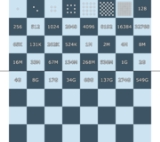
Wheat and Chessboard Problem
Overview
To solve this, observe that a chess board is an 8×8 square, containing 64 squares. If the amount of grains doubles on successive squares, then the sum of grains on all 64 squares is:
This equals 18,446,744,073,709,551,615 (18.4 quintillion).
This problem (or a variation of it) demonstrates the quick growth of exponential sequences
Exponential growth
Exponential growth occurs when the growth rate of a mathematical function is proportional to the function's current value...
.
While the story behind the problem changes from person to person, the fable usually follows the same idea:
When the creator of the game of chess (in some tellings an ancient Indian
History of India
The history of India begins with evidence of human activity of Homo sapiens as long as 75,000 years ago, or with earlier hominids including Homo erectus from about 500,000 years ago. The Indus Valley Civilization, which spread and flourished in the northwestern part of the Indian subcontinent from...
mathematician, in others a legendary dravida
Dravidian peoples
Dravidian peoples is a term used to refer to the diverse groups of people who natively speak languages belonging to the Dravidian language family. Populations of speakers of around 220 million are found mostly in Southern India. Other Dravidian people are found in parts of central India, Sri Lanka,...
vellalar
Vellalar
Vellalars were, originally, an elite caste of Tamil agricultural landlords in Tamil Nadu, Kerala states in India and in neighbouring Sri Lanka; they were the nobility, aristocracy of the ancient Tamil order and had close relations with the different royal dynasties...
named Sessa or Sissa
Sessa (Chaturanga)
Sessa was a legendary vellalar and creator of the game of chess ancestor, chaturanga....
) showed his invention to the ruler of the country, the ruler was so pleased that he gave the inventor the right to name his prize for the invention.


